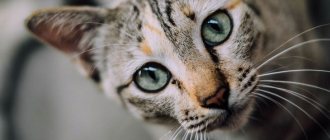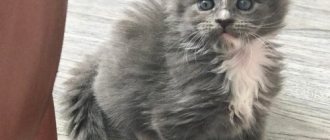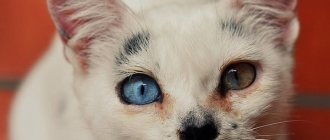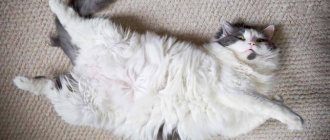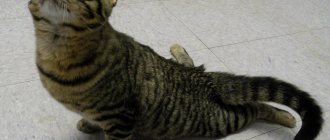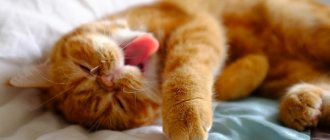7086Administration
A pet's illness is always scary, and it is not known who is more worried - the animal itself or its owner. But not all cat owners notice such a small, at first glance, problem as whisker breakage. Sometimes this is not just a physiological feature, but a signal of internal disorders. It is especially important to establish the reason why a kitten’s whiskers are breaking - the baby has just come into this world, but, quite possibly, something is already wrong with him. However, precaution is also important here - in some cases the whiskers break on their own, and there is no need to take the cat to the veterinarian. The question arises - how to determine when to worry?
The vigilant owner saw a broken mustache - what does this mean?
You probably heard in childhood that a cat with its whiskers cut off stops “smelling” or loses its sense of smell. This myth is actually reflected in the animal's loss of orientation. Whiskers - they are also called vibrissae - serve to spatially determine position. It is a fact that a cat, cat or kitten can use its whiskers to decide whether it will fit into a hole or a crack. It happens that this feeling fails them, and in the end they have to rescue the pet from trouble.
At the same time, thickening or excessive length of the mustache leads to deterioration of vision.
Some breeds (hairless, such as elf, sphinx, bambino) do not have whiskers at all; this is a normal phenomenon associated with genetic predispositions.
It is believed that the broken mustache has “served” its purpose and is replaced by a new one that has grown again. This occurs in sexually mature pets, accompanying molting, and is not considered an abnormal phenomenon. If the process begins to develop too intensively, and growth of the mustache is not observed, it is worth paying attention and establishing the causes of the pathology.
Why does a cat need a mustache?
Whiskers for representatives of the cat family, like many other animals, are vital. They perform an important function - they allow you to determine the position of surrounding objects. Each vibrissa, like ordinary hair, has a bulb that is immersed in the skin and surrounded by many nerve cells. Cat whiskers react sharply to air currents pushing off objects. This information enters the brain via nerve endings.
This organ of touch allows its owner to form a three-dimensional model of the surrounding space in his head. This method is so accurate that animals can even overcome a number of obstacles in complete darkness or with their eyes closed, without bumping into objects in the way.
Causes of vibrissae breakdown
They are as follows:
- Diet-related calcium deficiency. The food has an unbalanced composition or is simply not suitable for a particular pet. In addition to the whiskers, the claws also suffer, losing their hardness and becoming loose and layered. In addition to reviewing the purr's diet, the owner should stock up on vitamin and mineral supplements.
Important! It is impossible for a mustachioed pet to contain powdered dairy products in its diet; this requirement also applies to shelf-stable goods.
- A small amount of water in the diet provokes the loss of mustache and other unpleasant diseases.
- Reactions associated with intolerance of a specific substance by the body (allergy). For example, a flea bite due to the presence of a protein, a food component, that is atypical for a cat’s body.
If there are several animals in the house, their whiskers may fall out during fights between them: the cats find out which of them is the leader.
- Pathogenic bacteria and fungi, parasites (lice eaters and helminths): weakening the body, they negatively affect the appearance of the animal.
- The heating season and the dry air that accompanies it.
- Genetic structure - hairless cats may not have whiskers (or they fall off profusely).
- Frequent water treatments accompanied by washing with shampoo (if the product is of poor quality, the skin will be injured and peeled, and dandruff will appear).
- Disorders associated with hormonal levels. If the thyroid gland does not perform its function, the animal suffers from excess weight and brittle hair and whiskers.
- Malfunctions of the urinary system and kidneys (renal failure, urolithiasis).
What to do if a cat or kitten loses its whiskers
In fact, there are only a few reasons that provoke the occurrence of such a problem. Most often this occurs as a result of improper feeding or due to so-called physiological characteristics.
Also, the cause of mustache loss can be a fungal infection, the presence of helminths, or a vitamin-mineral imbalance. In addition, sometimes the problem can be purely psychological in nature. If several pets live in an apartment, among whom there is a baby whose whiskers have begun to fall out, then the root of the problem must be sought in the peculiarities of the relationship between individuals.
How can the owner help the pet?
If your pet has severely lost its whiskers, it is necessary to carefully examine it. Itching and skin diseases provoke hair loss and peeling of the epidermis in the sore spot. The animal can be especially bothered by head itching - as a result of constant washing and rubbing, the muzzle and whiskers will break off.
Itching is caused not only by food allergies, but also by atopic dermatitis, parasitic disease or lichen. The latter is extremely unpleasant due to its contagiousness, including to humans.
If focal baldness is detected, it is necessary to contact a specialist at the clinic. What else needs to be done?
- Firstly, the owner is obliged to establish what exactly the problem with the loss of the mustache is. Do the living conditions correspond to the normal existence of the animal - does the cat drink too little water, does it bathe often, is the air humid enough, what kind of food and shampoo is used.
- Preventive measures for deworming and eliminating parasites are carried out at least once every 4-6 months.
- With a cat, a visit to the clinic is necessary in case the pet is infected with a fungal infection or has a chronic disease.
- Be sure to review your diet and add foods rich in vitamins, minerals and healthy fatty acids. It is better to raise babies on natural food. If possible, buy holistic foods and premium food.
What are the consequences of losing a cat's whiskers?
The loss of whiskers in these animals can be equated to the loss of hearing or vision in humans. A cat without a mustache becomes helpless. She is deprived of the ability to navigate in space, move in the dark, sense approaching danger, or determine the temperature of food. The loss of a mustache, if it was not caused by pathological factors, is rather a psychological problem. This does not affect the cat's health in any way. Nothing threatens your pet in the home; he can determine the temperature of food with his paw, and use his vision to orient himself in space.
The only danger that threatens an animal that has lost its whiskers is injury during a jump from an object, the distance to which it could only determine with the help of its whiskers.
The loss of whiskers is a serious problem for outdoor representatives of this family, which exist in dangerous conditions in which their whiskers help them survive.
Preventive measures
Will help reduce the risk of your pet's whiskers breaking off. Owners can periodically treat for fleas, worms, and other parasites. The pet is given enough clean, fresh water. The room where the cat is kept is regularly ventilated and moistened. A selected and balanced diet includes supplements of minerals and vitamins. The animal is vaccinated against infections of viral origin. the number of water treatments is reduced, and the detergent must be suitable for the cat.
Important! You should not self-medicate your pet - it can take his life, consult a specialist!
If the cat, despite breaking off its whiskers, remains active and cheerful, then there is no reason to panic. A consultation with a veterinarian won’t hurt, and treatment and corrective care will make your cat’s life even better.
What diseases lead to the loss of vibrissae?
Those who want to understand why a kitten's whiskers break should be aware that the root of this problem may lie in health problems of the pet.
An animal may begin to lose its whiskers if it is diagnosed with a food allergy. In such cases, not only the mustache, but also the hair may fall out. To get rid of these symptoms, you need to contact a veterinarian and undergo all tests to identify the allergen.
Hypothyroidism can also cause mustache loss. This disease usually affects older animals. It leads to disruption of metabolic processes occurring in the cat's body. Typical symptoms of hypothyroidism include loss of whiskers and fur, hyperactivity and increased appetite. In some cases, this disease may be accompanied by vomiting, diarrhea and weight loss. If you notice one or more of the above signs, you should immediately consult a veterinarian. The specialist will prescribe a series of examinations, based on the results of which it will be possible to select the appropriate treatment.
Whiskers may also fall out if the cat has a disease that weakens the immune system.
Is losing a mustache normal or nonsense?
Losing whiskers in cats is a common phenomenon: new ones grow in place of old ones. The change of coarse hairs on the muzzle accompanies seasonal molting and should not cause concern. Anyway, before you panic - “The cat’s whiskers are falling out - what should I do?” - It is worth examining the separated hairs.
The bulb at the base will indicate the end of the natural cycle of vibrissa development. A beveled tip is evidence of thinning and weakening of the animal’s coat.
You need to worry if the whiskers are severely broken and are rapidly leaving the pet’s face. To prevent complete baldness, you should visit a veterinarian and find out why your cat’s whiskers are falling off or deformed.
- genetic predisposition (sharp examples are sphinxes, which nature has endowed with such soft hairs that they constantly break and curl, or Cornish rexes with thin and unruly vibrissae-webs);
- serious internal disease associated with metabolic disorders;
- the presence of parasites (fungal infection, worms, lichen, ticks);
- a lack of keratin, the main structural component of hair, is a common reason why a cat’s whiskers break;
- feline curiosity, forcing the home “researcher” to singe the fur on the flame of a candle or the fire of a switched on stove;
- human prejudices (a cat's whisker is believed to bring good luck);
- the result of a child’s prank who decided to shave his four-legged friend;
- fun of a kitten with brothers and sisters or maternal care;
- “battle losses” in fights of an adult alpha male.
We suggest you read: Why beavers build dams
Most often, the loss of whiskers is not associated with any abnormalities. Regardless of the molting period, they can be periodically renewed - old vibrissae fall out, and new ones appear in their place. The reason why a cat's whiskers fall out can be a fight with another animal or excessive curiosity, in which he comes too close to a burning fire.
What to do?
Felinologists at the ORBITA KLK center insist that if a cat’s whiskers have disappeared or decreased in length, it is necessary to immediately find the cause of this pathology and, without bringing the animal to stress, solve it.
First of all, you should review your pet’s diet and change the food or, as veterinarians advise, switch to human food, since natural products, in addition to being a source of useful elements, are easier to digest. But do not forget that the pet’s menu should be balanced and consist exclusively of fresh products. When the whiskers are broken and do not grow for a long time, the cat may need an additional complex of vitamins, but their administration should be done exclusively by a veterinarian.
Cestal will relieve the animal of helminthic infestation.
If helminths are identified, which also cause whiskers to break off, it is advisable to undergo a course of anthelmintic therapy using the following drugs:
- "Cestal";
- "Prasitel";
- "Quantum";
- "Prasitid";
- "Kanikvakntel".
If a fungal infection is suspected, one of the following medications is usually prescribed:
- "Amphotericin";
- "Potassium iodide";
- "Amoxicillin."
When cats have broken whiskers for a long time, a parasite may have settled on the pet’s skin. Do not hesitate to visit a specialized physician; it is important to identify the type of pest and the extent of damage as early as possible. You can give injections yourself or feed your animal pills, but only after the doctor prescribes the most appropriate medication and describes the correct use of it. Sometimes external use of local drugs is sufficient, but in other cases complex therapy is required, including antibacterial drugs in the regimen.
Prevention
What to do if an unpleasant situation occurs? It is impossible to help a pet at home. Veterinarian consultation required. The doctor will examine the animal, take tests and, based on the results, prescribe a course of treatment.
In most cases, mustache loss is a sign of other serious diseases. Let us note the main methods of treatment for different diagnoses:
- Parasites - anthelmintics (tablets for worms) and other antiparasitic drugs are prescribed.
- Allergies - antihistamines.
- Infections - antibiotics.
- Avitaminosis - a course of essential minerals and substances (fatty acids, biotin, taurine, etc.). The main thing when taking it is to strictly follow the dosages prescribed by the veterinarian. Otherwise, the situation will worsen.
At home, as mentioned above, it is better to adhere to a balanced diet, avoid low humidity, and carry out a preventive course of treatment for worms and parasites. A prerequisite is the presence of a sufficient amount of water, especially when feeding dry food. Preferably starting from the middle price range.
Ultimately, a cat's whiskers are not just for beauty. They perform an important tactile function, helping to navigate a new environment or find a common language with representatives of the opposite sex.
In order to avoid trouble with your pet’s whiskers from a young age, you need to follow just a few rules and be careful. The animal must be fed well-balanced food of good quality. It is extremely important that the growing body receives everything it needs for healthy development.
It is necessary to provide the kitten with protection from other pets, if there are any in the house. When he grows up, he will be able to stand up for himself, but at 2 months and even a little older, it is worth stopping attempts to clarify the relationship between animals.
To avoid various parasites, you need to maintain hygiene, wash the kitten promptly and regularly give deworming medications. Periodic visits to the veterinarian for preventive maintenance will allow you to learn about all health problems at the stage of their development and prevent the occurrence of complications.
